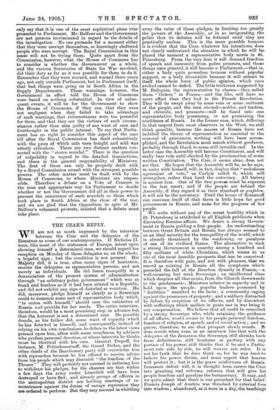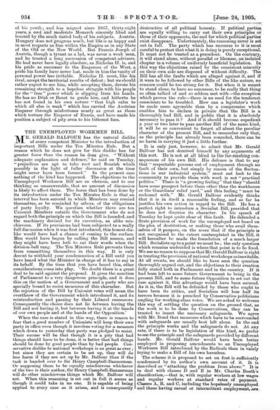W E are not so much impressed by the interview between
the Czar and the delegates of the Zemstvos as some of our contemporaries. If Nicholas II. were, like most of the statesmen of Europe, intent upon showing himself a determined man, we should regard his reception on Monday of those delegates as, on the whole, a hopeful sign ; • but the condition is not present. His Majesty did, it is true, after many signs of hesitation, receive the delegates as representative persons, and not merely as individuals. He did listen tranquilly to a denunciation of the present system of administration through "an arbitrary police government" which was as frank and fearless as if it had been uttered in a Republic, and did not exhibit any sign of disbelief or vexation. He did, moreover, pledge himself as clearly as a Sovereign could to summon some sort of representative body which, "in union with himself," should cure the calamities of Russia aud provide for her needs. The entire interview, therefore, would be a most promising step in advance but that the Autocrat is not a determined man. He possibly dreads, as his father did, some want of capacity which he has detected in himself, and consequently, instead of relying on his own conclusions, lie defers to the latest views pressed upon him, often with some roughness, by advisers who profess personal devotion, or whose interests he thinks must be identical with his own. General Trepoff, for instance, M. Pobiedonostzeff, the Grand Dukes, and the other chiefs of the Reactionary party will overwhelm him with reproaches because he has offered to receive advice from his people which may diminish " the freedom of the Throne." They will probably not succeed in inducing him to withdraw his pledges, for the chances are that within a few days the army under Linevitch will have been destroyed or have fled; and already groups of officers in the metropolitan district are holding meetings of re- monstrance against the duties of savage repression they are ordered to perform. But they may succeed in whittling away the valne of those pledges, in limiting too greatly the powers of the Assembly, or in so iniigoratieg the police that its debates will be fettered until they are practically useless. This is the more possible because it is evident that the Czar, whatever his intentions, does not clearly understand the situation in which he will 1:13 placed the moment a representative body meets in St. Petersburg. From the very first it will demand freedom of speech and immunity from police pressure, and those things once granted, it will become a Parliament, —that is, either a body quite powerless because without popular support, or a body irresistible because it will attract to itself the whole force of public opinion, which 'once evoked cannot be defied. The little trickeries suggested by M. Bulyguin, the representation by classes—they called. them " Orders " in Franco—and the like, will have no more effect than they had in the French Revolution. They will be swept away by some vote or some outburst of the people, and the men elected—nobles, and traders, and clericals, and peasants—will be fused into one representative body possessing, or not possessing, the confidence of Russia. In the former case, which, differing- in that respect from most observers in the West, we still think possible, because the masses of Russia have not imbibed the theory of representation as essential to the. removal of grievances, nothing will have been accom- plished, and the Revolution must march without guidance,. probably through blood, to some still invisible end. In the• latter case the Assembly will become Constituent, and will' really bear rule until checked by the proclamation of some' written Constitution. The Czar, it seems clear, does not see that. He hopes that the Assembly will be, as he says, in unity with himself, will, in fact, display that "melodious. agreement of vote," as Carlyle called it, which will strengthen rather than limit the autocracy. All history is against him. One of the two powers must be supreme in the last resort, and if the people are behind the Assembly, if they regard it as their standard or gonfalon, it will not be the autocracy. Until the house of Romanoff. can convince itself of that there is little hope for good' government in Russia, and none for the progress of her people. We write without any of the secret hostility which in St. Petersburg is attributed to all English publicists when discussing Russian affairs. We desire a strong Govern-' ment in Russia guiding a free people. An understanding between Great Britain and Russia has always seemed to us an ideal security for the tranquillity of the world, which is already threatened by the weakening or paralysis of one of its civilised States. The alternative to such a strong Government is anarchy among a hundred and fifty millions of white Christians, which seems to us one of the most horrible prospects that can be conceived: It is therefore with pain, and not with pleasure, that we record as existing in Russia all the symptoms which preceded the fall of the Bourbon dynasty in France,—a well-meaning but weak Sovereign ; an intellectual class which despises all that exists, from the Church downwards to the gendarmerie; Ministers inferior in capacity and in hold upon the people ; popular leaders possessed by "doctrines " unsuited to the facts ; a community raging against the possessors of property ; and a soldiery distracted by defeat, by suspicion of its officers, and by discontent with sufferings which neither in peace nor in war bring it any compensation. We believe that all could be remedied by a strong Sovereign who, while retaining the guidance of all affairs, would secure to his people personal freedom, freedom of religion, of speech, and of social action ; and we grieve, therefore, to see that prospect slowly recede. Pt does recede when even in an interview like that with the delegates of the Zemstvos the Sovereign still shrinks back from definiteness, still hesitates at parting with any portion of his power, still thinks that if he and a Parlia- ment rule side by side, lie will remain sole ruler. It is not his fault that he does think so, for he was bred-to believe his power divine, and must expect that heaven will protect it ; but it is the grave misfortune of Russia. Incessant defeat will, it is thought here, coerce the Czar into granting real reforms, reforms that will give his people freedom and paralyse the bureaucracy. It may, and we quite admit that there is one precedent for that 'belief: Francis Joseph of Austria was thrashed by external foes into wisdom ; abandoned, as it were in a day, the teachingi years, a cool and much Monarch sincerely liked and trusted, by the niuch varied body of his subjects. Austria-, Hungary does not progress much, but life is as happy and in most respects as free within the Empire as in any State of the . Old or the New World. .But Francis Joseph of Austria, though a tyrant as a lad, was never a weak man, and he trusted a long" succession of competent advisers. He had never been legally absolute, as Nicholas II. is, and his pride as successor to the Emperors of the West, a pride his family have never lost, made in him the vanity of personal power less irritable. Nicholas IL must, like his rival, accept the territorial results, of defeat ; but we should rather expect to see him, while accepting them, devote his remaining strength to a hopeless struggle with his people for the " free " power which is slipping from his hands. He has no D6ak or Beust to guide him, and hitherto he has not found in his own nature " that high calm to which all else is weak " which has carried the Austrian Emperor through misfortunes nearly as great as those which torture the Emperor of Russia, and have made his position a subject of pity even to his bitterest foes.



















































 Previous page
Previous page